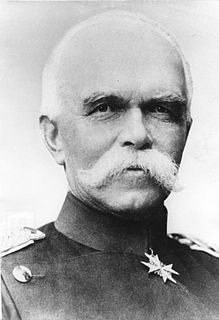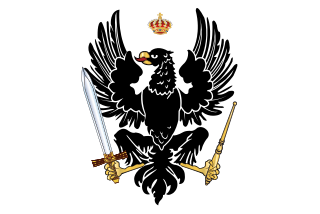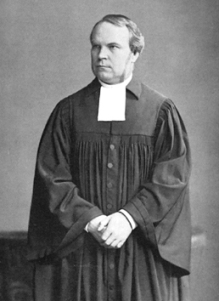Related Research Articles

The German Empire or the Imperial State of Germany, also referred to as Imperial Germany or Second Reich, as well as simply Germany, was the period of the German Reich from the unification of Germany in 1871 until the November Revolution in 1918, when the German Reich changed its form of government from a monarchy to a republic.

Otto Eduard Leopold, Prince of Bismarck, Duke of Lauenburg, known as Otto von Bismarck, was a conservative German statesman who masterminded the unification of Germany in 1871 and served as its first chancellor until 1890, in which capacity he dominated European affairs for two decades. He had previously been Minister President of Prussia (1862–1890) and Chancellor of the North German Confederation (1867–1871). He provoked three short, decisive wars, against Denmark, Austria, and France. Following the victory against Austria, he abolished the supranational German Confederation and instead formed the North German Confederation as the first German national state, aligning the smaller North German states behind Prussia, and excluding Austria. Receiving the support of the independent South German states in the Confederation's defeat of France, he formed the German Empire – which also excluded Austria – and united Germany.

Maximilian, Margrave of Baden, also known as Max of Baden, was a German prince, general and politician. He was heir presumptive to the throne of the Grand Duchy of Baden, and in October and November 1918 briefly served as Chancellor of the German Empire. He sued for peace on Germany's behalf at the end of World War I based on U.S. President Woodrow Wilson's Fourteen Points, which included immediately transforming the government into a parliamentary system, by handing over the title of chancellor to SPD Chairman Friedrich Ebert and unilaterally proclaiming the abdication of Emperor Wilhelm II. Both events took place on 9 November 1918, the beginning of the Weimar Republic.

The German Bundesrat is a legislative body that represents the sixteen Länder of Germany at the federal level. The Bundesrat meets at the former Prussian House of Lords in Berlin. Its second seat is located in the former West German capital of Bonn.

Alfred Peter Friedrich von Tirpitz was a German Grand Admiral, Secretary of State of the German Imperial Naval Office, the powerful administrative branch of the German Imperial Navy from 1897 until 1916. Prussia never had a major navy, nor did the other German states before the German Empire was formed in 1871. Tirpitz took the modest Imperial Navy and, starting in the 1890s, turned it into a world-class force that could threaten Britain's Royal Navy. However, during World War I, his High Seas Fleet proved unable to end Britain's command of the sea and its chokehold on Germany's economy. The one great engagement at sea, the Battle of Jutland, ended in a narrow German tactical victory but a strategic failure. As the High Seas Fleet's limitations became increasingly apparent during the war, Tirpitz became an outspoken advocate for unrestricted submarine warfare, a policy which would ultimately bring Germany into conflict with the United States. By the beginning of 1916, he was dismissed from office and never regained power.

Georg Leo Graf von Caprivi de Caprera de Montecuccoli, born Georg Leo von Caprivi, was a German general and statesman who served as Chancellor of Germany from March 1890 to October 1894. Caprivi promoted industrial and commercial development, and concluded numerous bilateral treaties for reduction of tariff barriers. However, this movement toward free trade angered the conservative agrarian interests, especially the Junkers. He promised the Catholic Center party educational reforms that would increase their influence, but failed to deliver. As part of Kaiser Wilhelm's "new course" in foreign policy, Caprivi abandoned Bismarck's military, economic, and ideological cooperation with the Russian Empire, and was unable to forge a close relationship with the United Kingdom of Great Britain and Ireland. He successfully promoted the reorganization of the German military.

The Kingdom of Prussia was a German kingdom that constituted the state of Prussia between 1701 and 1918. It was the driving force behind the unification of Germany in 1871 and was the leading state of the German Empire until its dissolution in 1918. Although it took its name from the region called Prussia, it was based in the Margraviate of Brandenburg. Its capital was Berlin.

The Junkers were members of the landed nobility in Prussia. They owned great estates that were maintained and worked by peasants with few rights. These estates often lay in the countryside outside of major cities or towns. They were an important factor in Prussia and, after 1871, in German military, political and diplomatic leadership. The most famous Junker was Chancellor Otto von Bismarck. Bismarck held power in Germany from 1871 to 1890 as Chancellor of the German Empire. He was removed from power by Kaiser Wilhelm II.

Ferdinand August Bebel was a German socialist politician, writer, and orator. He is best remembered as one of the founders of the Social Democratic Workers' Party of Germany (SDAP) in 1869, which in 1875 merged with the General German Workers' Association into the Socialist Workers' Party of Germany (SAPD). During the repression under the terms of the Anti-Socialist Laws, Bebel became the leading figure of the social democratic movement in Germany and from 1892 until his death served as chairman of the Social Democratic Party of Germany.

Prussia was a historically prominent German state that originated in 1525 with a duchy centered on the region of Prussia on the southeast coast of the Baltic Sea. It was de facto dissolved by an emergency decree transferring powers of the Prussian government to German Chancellor Franz von Papen in 1932 and de jure by an Allied decree in 1947. For centuries, the House of Hohenzollern ruled Prussia, successfully expanding its size by way of an unusually well-organised and effective army. Prussia, with its capital first in Königsberg and then, when it became the Kingdom of Prussia in 1701, in Berlin, decisively shaped the history of Germany.

Bernhard Heinrich Karl Martin von Bülow, created Fürst von Bülow in 1905, was a German statesman who served as Foreign Minister for three years and then as Chancellor of the German Empire from 1900 to 1909. A fervent supporter of Weltpolitik, Bülow single-mindedly devoted his chancellorship to making Germany a leading power on the world stage. Despite presiding over sustained economic growth and technological advancement within his country, his government's foreign policy did much to antagonize the international community and significantly contributed to the outbreak of the First World War.
The German Conservative Party was a right-wing political party of the German Empire founded in 1876. It largely represented the wealthy landowning elite Prussian Junkers.
The Free Conservative Party was a moderate right-wing political party in Prussia and the German Empire which emerged from the German Conservative Party in the Prussian Landtag in 1866. In the federal elections to the Reichstag parliament from 1871, it ran as the German Reich Party.

Wolfgang Kapp was a Prussian civil servant and journalist. He was a strict nationalist, and a failed leader of the so-called Kapp Putsch.

Adolf Stoecker was a German court chaplain to Kaiser Wilhelm I, a politician, leading antisemite, and a Lutheran theologian who founded the Christian Social Party to lure members away from the Social Democratic Workers' Party.

The Erfurt Union was a short-lived union of German states under a federation, proposed by the Kingdom of Prussia at Erfurt, for which the Erfurt Union Parliament, lasting from March 20 to April 29, 1850, was opened at the former Augustinian monastery in Erfurt. The union never came into effect, and was seriously undermined in the Punctation of Olmütz under immense pressure from the Austrian Empire.
The Constitution of Prussia was adopted on 31 January 1850, and amended in the following years. This constitution was far less liberal than the federal constitution of the German Empire.

The Anti-Socialist Laws or Socialist Laws were a series of acts, the first of which was passed on 19 October 1878 by the Reichstag lasting until 31 March 1881 and extended four times.

Wilhelm Hasenclever was a German politician. He was originally a tanner by trade but later became a journalist and author. However, he is most known for his political work in the predecessors of the Social Democratic Party of Germany (SPD).

The Navy League or Fleet Association in Imperial Germany was an interest group formed on April 30, 1898 on initiative of Admiral Alfred von Tirpitz through the German Imperial Naval Office (Reichsmarineamt) which he headed (1897–1916) to support the expansion of the Imperial German Navy (Kaiserliche Marine). Specifically it was intended to develop popular pressure on the German parliament (Reichstag) to approve the Fleet Acts of 1898 and 1900, and the attendant expenses.
References
- ↑ "History, Modern British and European, publisher: Letts"